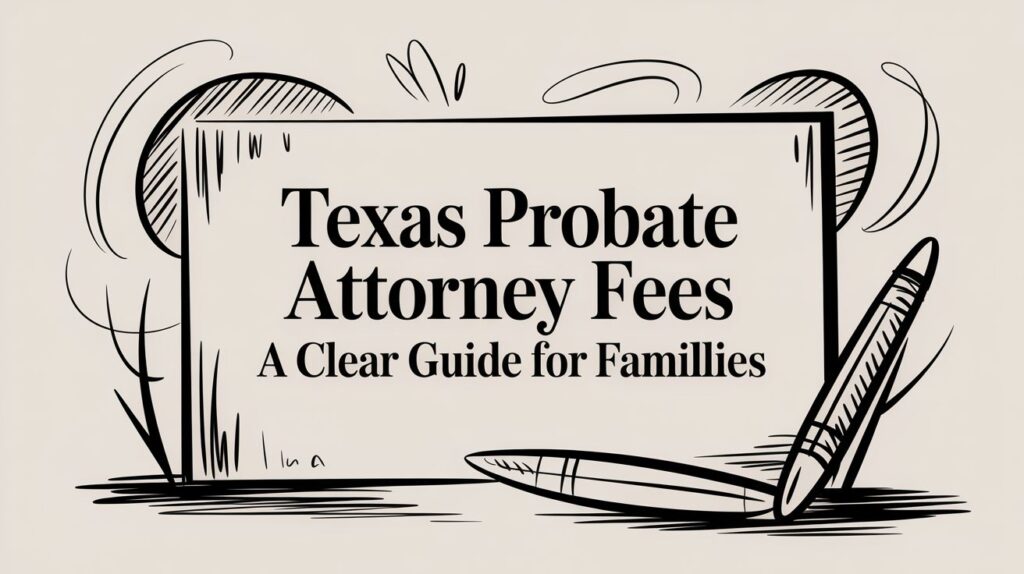When a loved one passes away, the legal complexities of probate can be overwhelming, particularly when dealing with real estate held in Limited Liability Companies (LLCs). Understanding how Texas probate law intersects with LLC ownership is crucial for ensuring a smooth transition of assets. This article provides an in-depth exploration of the process, offering clarity on how to navigate probate for real estate within an LLC in Texas.
Understanding Probate and LLCs
What is Probate?
The legal process manages and distributes a deceased person’s estate through probate. This typically involves validating the will, paying debts and taxes, and distributing the remaining assets to beneficiaries. Probate transfers the decedent’s assets to the rightful heirs or beneficiaries in an orderly manner.
What is an LLC?
An LLC is a business structure that combines the limited liability of a corporation with the tax benefits of a partnership. LLCs offer flexibility in management, pass-through taxation, and protection of personal assets from business liabilities. The LLC entity owns real estate held in an LLC, not the individual members.

Intersection of Probate and LLCs
Holding real estate in an LLC complicates the probate process. The LLC owns the property, not the individual, so the transfer of ownership upon death must adhere to both probate laws and the operating agreement of the LLC. This dual layer of regulation requires careful navigation to ensure compliance and proper asset distribution.
Advantages of Holding Real Estate in an LLC
Before diving into the probate process, it’s essential to understand why individuals choose to hold real estate in an LLC. The primary advantages include:
Limited Liability
LLC members enjoy protection from personal liability for the LLC’s debts and obligations. This protection means creditors generally cannot pursue the members’ assets if the LLC incurs debt or faces a lawsuit.
Operational Flexibility
LLCs provide a flexible management structure, enabling members to decide how they run the company. This is particularly useful for managing multiple properties, as the LLC can set specific rules for property management, member roles, and decision-making processes.
Pass-Through Taxation
LLCs typically benefit from pass-through taxation, where the LLC itself does not pay taxes on its income. Instead, the members report profits and losses on their personal tax returns, passing them through and avoiding the double taxation faced by corporations.
Estate Planning
Transferring real estate in an LLC follows the operating agreement, potentially bypassing some probate complexities. This method simplifies managing asset distribution upon a member’s death, ensuring adherence to the decedent’s wishes.
The Probate Process for Real Estate in an LLC
Review the Operating Agreement
The first step in dealing with probate for real estate held in an LLC is to review the LLC’s operating agreement. This document outlines the rules and procedures for transferring ownership upon a member’s death. It may include provisions for buyouts, the admission of new members, or the dissolution of the LLC.
Determine Membership Interest
In probate, the deceased member’s interest in the LLC transfers, not the real estate itself. The operating agreement specifies how to handle this interest. If the agreement is silent on this matter, state default rules will apply.
File the Will and Begin Probate

To initiate probate, file the deceased’s will with the appropriate Texas probate court. The court will validate the will and appoint an executor or personal representative to manage the estate. If there is no will, the court will appoint an administrator and distribute the estate according to Texas intestacy laws.
Notify LLC Members and Creditors
The executor must notify the other LLC members and any creditors of the deceased’s interest in the LLC. This step ensures that all parties are aware of the pending transfer and can address any claims or disputes.
Valuation of the LLC Interest
To determine the worth of the LLC, you must value the deceased’s interest. This valuation is essential for probate and tax purposes. You can hire an independent appraiser to assess the value based on the LLC’s assets, liabilities, and overall financial health.
Transfer of Membership Interest
Once the valuation is complete, the deceased’s interest in the LLC can be transferred according to the operating agreement. This may involve:
- Buyout by Remaining Members: The operating agreement may allow or require the remaining members to buy out the deceased’s interest.
- Transfer to Heirs: If allowed by the operating agreement, the membership interest may be transferred directly to the heirs.
- Sale of Interest: The interest may be sold to an outside party if permitted by the operating agreement and agreed upon by the remaining members.
Distribution of Proceeds
If the interest is sold, the proceeds are distributed according to the terms of the will or intestacy laws. If transferred to heirs, they become the new LLC members and assume the associated rights and responsibilities.
Key Tax Considerations for Probate of LLC-Owned Texas Real Estate
Filing Final Income Tax Returns
The transfer of LLC interest has significant tax implications. The executor must file the deceased’s final income tax return, which includes all income earned up to the date of death. This ensures that the decedent’s tax obligations are fulfilled.
Estate Tax Considerations
Depending on the value of the estate, an estate tax return may be required. The federal estate tax applies to estates exceeding a certain threshold, and Texas does not have a state estate tax. Proper planning and valuation are crucial to manage potential estate tax liabilities.
Capital Gains Tax
Heirs or new members may face capital gains tax if they sell their inherited interest. The basis of the inherited LLC interest is typically stepped up to the fair market value at the time of the decedent’s death, which can affect the amount of capital gains tax owed upon sale.
Avoiding Probate with LLCs
One of the primary benefits of holding real estate in an LLC is the potential to avoid probate altogether. This can be achieved through careful estate planning, including:
Operating Agreement Provisions
Crafting an operating agreement with clear provisions for the transfer of interest upon death can streamline the process. This agreement should specify how the interest will be valued, who has the right to purchase it, and any restrictions on transfer.
Trusts
Placing the LLC interest in a trust can bypass probate, as the trust’s terms dictate the transfer of interest. This allows for a more private and potentially quicker transfer of assets without court involvement.

Joint Ownership
Establishing joint ownership with rights of survivorship ensures that the surviving owner automatically inherits the interest, avoiding probate. This arrangement must be documented in the LLC operating agreement and other legal documents.
Challenges and Considerations
Dealing with probate for real estate in an LLC is not without challenges. Some considerations include:
Disputes Among Members
The death of a member can lead to disputes among remaining members, especially if the operating agreement is unclear or silent on the transfer of interest. Clear communication and legal guidance can help mitigate these conflicts.
Complex Valuation
Valuing the LLC interest can be complex, requiring professional appraisals and potentially leading to disagreements. Accurate and fair valuation is essential for a smooth probate process and equitable distribution.
Tax Liabilities
The transfer of interest can trigger significant tax liabilities, impacting the estate’s value and the beneficiaries’ inheritance. Consulting with tax professionals can help navigate these complexities and minimize tax burdens.
Conclusion: Navigating Probate for LLC-Owned Real Estate in Texas
Dealing with probate for real estate held in LLCs in Texas requires a thorough understanding of both probate laws and LLC operating agreements. While the process can be complex, careful planning, clear documentation, and professional guidance can ensure a smooth transition of assets.
Whether you’re an executor, a surviving LLC member, or an heir, knowing your rights and responsibilities is crucial. By taking proactive steps, you can navigate the probate process effectively, honor the deceased’s wishes, and protect the interests of all parties involved. This comprehensive guide provides the foundation you need to manage probate for LLC-owned real estate with confidence and clarity.








